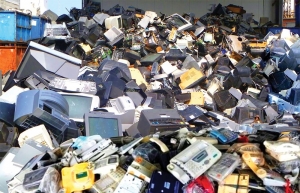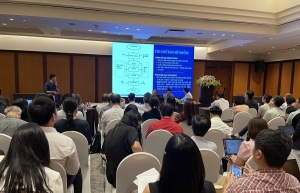Clearing up issues related to recycling costs
According to the provisions of the Law on Environmental Protection, “Fs” is the norm of product and package recycling costs determined based on the total reasonable and valid costs for collection, transportation treatment, and recycling of products and packages, cost of management, and organisation of recycling activities of the Vietnam office for extended producer responsibility (EPR) and the Vietnam Environmental Protection Fund (VEPF).
 |
| Nguyen Thi - Senior legal expert Department of Legal Affairs Ministry of Natural Resources and Environment |
Fs is the basis for producers and importers to determine the amount of financial contribution that they will contribute to the VEPF if they cannot recycle themselves. According to the regulations, producers and importers of products like batteries, accumulators, tyres, lubricants, and packages for food, cosmetics, drugs, fertilisers, animal feed, detergents, and commercial cement will be responsible for recycling costs starting from January 2024. Electrical and electronic products will be included from 2025 and vehicle products from 2027.
Fs is calculated based on the following many factors, including the legal provisions on Fs in Decree No.08/2022/ND-CP dated January 2022. It requires producers and importers of certain products and packages to take responsibility for recycling and treatment based on mandatory recycling rates and specifications. As a rule, the components of Fs do not include the cost of scrap collection (scrap purchase price).
Besides that, the norms are calculated based on recycling practices in Vietnam. The calculation is based on the survey results at 33 recycling facilities in the north and 33 in the south. The Fs of Vietnam is different from markets that are pioneers in classifying waste at source and applying EPR such as in Europe or South Korea.
These countries have developed recycling and collection system, which do not arise intermediate costs, simultaneously direct costs for collection and recycling can be low thanks to the modern machinery creating high productivity. In Vietnam, transportation costs are high and the amount of non-recyclable materials that have to be processed or recycled to low-quality materials accounts for at least 30 per cent, thus pushing the actual costs inflated.
Regarding products and packages yet to be officially recycled in Vietnam, the determination of related costs is based on the cost of recycling and collecting the materials compared against similar costs in some countries and territories that applied the EPR policy, such as Korea, Taiwan, and Singapore.
However, comparing and contrasting Fs in Vietnam with other countries are for reference because in most countries, the recycling fees are set by organisations authorised by producers and importers (or PRO), and these fees must be suitable with a market agreement mechanism. In a few countries and territories, such as Taiwan and Singapore, the fees are defined by the state. In addition, the approach and application of fees vary from place to place.
The administrative costs in the Fs are currently similar to the costs that some other funds in Vietnam are applying, such as the Tobacco Control Fund, and the Vietnam Public-utility Telecommunication Service Fund. In addition, the offered administrative costs in Fs are lower than international practice (usually accounting for 10-25 per cent of the total cost).
The adjustment coefficient reflects the capacity and efficiency of recycling for each type of product and packaging and the encouragement level for the development of recycling technology for each type of product or packaging. On the other hand, the high costs will create a recycling support fund for products and packages that are not officially recycled or are rarely recycled due to high recycling costs and low profits.
The application of the EPR policy is to fully implement the polluter-pays principle to reduce the burden of the state budget for the collection and treatment of solid household waste, simultaneously impacting producers and importers and forcing them to change the design of products and packaging in the direction of being easy to collect and recycle.
Producers and importers are not encouraged to pay money to the VEPF to fulfill their EPR because the law allows producers either recycle themselves or hire recycling facilities or authorise intermediate organisations to support recycling efforts.
Furthermore, producers can combine all three methods for different products and packings to optimise the effectiveness, ensure market principles, reducing costs for businesses.
Accordingly, Fs needs to be at a certain level so that producers and importers can recycle by themselves via the support of the intermediate organisations to optimise the implementation of extended responsibilities of producers as similar to the experience of many markets such as Europe, South Korea, and Japan implementing EPR during the past 30 years.
Last but not least, many producers’ proposal to take the Fs to zero, which means that they will not have to pay the fees to recycle products and packaging, is unfounded because this proposal is inconsistent with the regulations on EPR here and the Decree No.08.
This proposal is also inconsistent with international practices. In countries where EPR has been regulated, producers and importers have the responsibility to pay recycling fees for their products and packaging, which are mentioned in the portfolio of products under their recycling responsibility.
| Dr. Fritz Flanderka - Managing Director Reclay Group You cannot compare the fees producers must pay in a DRS with the costs producers must pay with an PRO system. In DRS, there are mainly PET bottles and aluminum cans included, which have a market price. Further, the DRS is gaining a great income through unredeemed deposits, which covers almost half of the operation costs. Thus, the fee producers must pay for DRS is lower than the fee they must pay with a PRO. Even between DRS fees of different countries there are differences. In Germany, the DRS fee is much higher than that of Norway, because the system operates due to the different conditions in both countries. Thus it is not necessarily reasonable to compare prices between different countries as prices depend a lot on the conditions within the country. |
 | E-waste recycling costs unsettle FIEs Many foreign-invested manufacturers are concerned about the high recycling costs of electronic waste, which could create a significant financial burden for their businesses and potentially lead to increased product prices for consumers. |
 | Businesses recoil at high recycling costs While domestic and foreign-invested enterprises welcome the calculation of reasonable and valid recycling cost for packaging, they are seeking flexible application and supporting policies to ensure sustainable development. |
What the stars mean:
★ Poor ★ ★ Promising ★★★ Good ★★★★ Very good ★★★★★ Exceptional
Related Contents
Latest News
More News
- Citi economists project robust Vietnam economic growth in 2026 (February 14, 2026 | 18:00)
- Sustaining high growth must be balanced in stable manner (February 14, 2026 | 09:00)
- From 5G to 6G: how AI is shaping Vietnam’s path to digital leadership (February 13, 2026 | 10:59)
- Cooperation must align with Vietnam’s long-term ambitions (February 13, 2026 | 09:00)
- Need-to-know aspects ahead of AI law (February 13, 2026 | 08:00)
- Legalities to early operations for Vietnam’s IFC (February 11, 2026 | 12:17)
- Foreign-language trademarks gain traction in Vietnam (February 06, 2026 | 09:26)
- Offshore structuring and the Singapore holding route (February 02, 2026 | 10:39)
- Vietnam enters new development era: Russian scholar (January 25, 2026 | 10:08)
- 14th National Party Congress marks new era, expands Vietnam’s global role: Australian scholar (January 25, 2026 | 09:54)

 Tag:
Tag:















 Mobile Version
Mobile Version